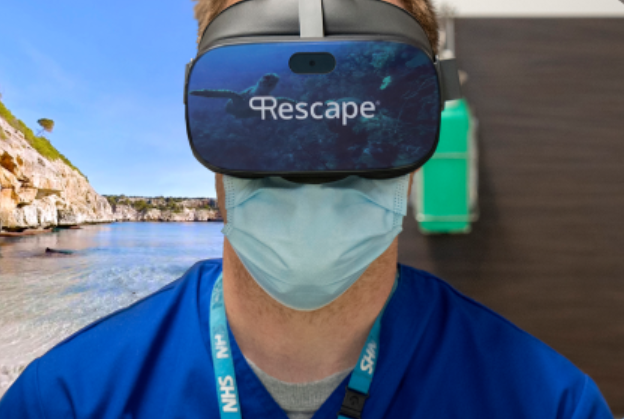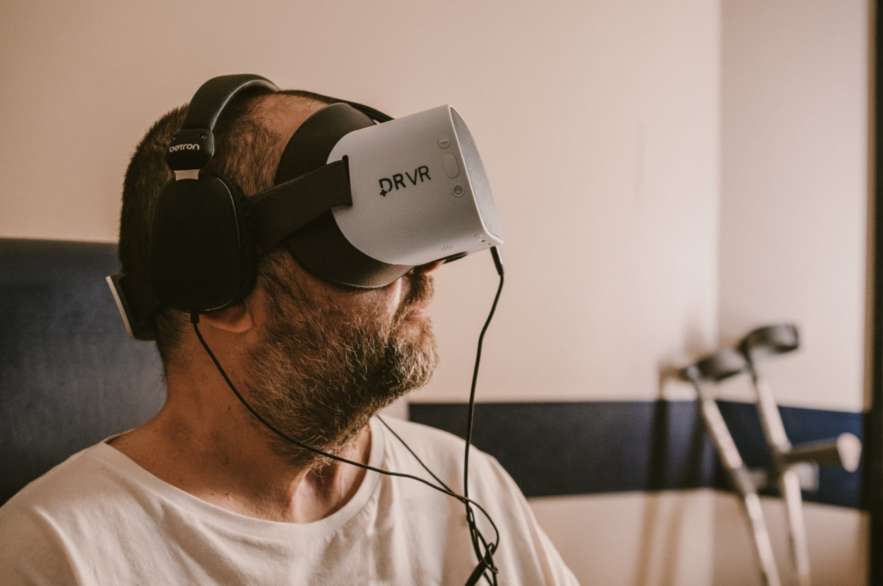A Cardiff-based start-up is pioneering virtual reality therapy in Wales and beyond
OVER the past few years, virtual reality has finally made it into the mainstream – and now, it is finding its way into Welsh hospitals.
Many tech companies insist that in the near future, we will all be glued to VR headsets, carrying out our everyday lives in the ‘Metaverse’; a series of interconnected virtual worlds where we can do anything and be anyone.
So far, this Metaverse has been met with a combination of suspicion and ridicule. Many of the companies making these grand promises have failed to come up with anything more exciting than awkward 3D work conferences and virtual shopping trips. They have done little to refute the suggestion that the Metaverse might just be “a deeply uncomfortable, worse version of Zoom.”
On top of that, despite being relatively new technology, virtual reality has already proven to be extremely vulnerable to disinformation, hate speech and harassment. This is especially worrying considering how involved Facebook, a company famously bad at keeping content like this off its platforms, is in this new frontier.
None of this inspires confidence. But there is no doubt that virtual reality could be transformative – and nowhere more so than in healthcare.
“The potential is huge,” said Matt Wordley, CEO and founder of Rescape, a Cardiff start-up based in Trade Street which has developed a range of VR headsets for use in the healthcare sector.
He added: “Done in the right way, there is an opportunity that this technology can be used for good, to actually help people and bring them together.
“I know social media set out with that aim and obviously ended up with a whole load of horrendous consequences. But we’re absolutely driven to ensure that the part of the Metaverse we create is used for good.”
❝There really is a gift and an opportunity to take people elsewhere and do things they may not be able to do otherwise ❞
Matt points to a 2018 TEDx talk given by Dr Mark Taubert, a palliative care consultant at Velindre Cancer Hospital, as the moment when he began to imagine how VR could transform healthcare.
Working on a pro bono basis for the hospital, Rescape started out by recording every aspect of an MRI scan. They then recreated it in VR, building a virtual MRI experience that could be used to put patients nervous about the procedure at ease.
Matt said: “For a lot of people who haven’t been through an MRI scan before, it’s actually something that is quite petrifying, to the extent where they don’t turn up to the appointment.
“We thought that we could potentially communicate quite quickly using VR that although an MRI scan is not a pleasant experience, it is not something to be scared of.”
The pilot succeeded in reducing the number of missed appointments – and since then, Rescape’s work has exploded. Now, the company’s VR headsets are used by health boards across Wales, in a dizzying variety of different medical contexts.
Their VR products have been used to treat mental health conditions, support women going through labour and have even been used to reduce stress among NHS staff facing burnout during the pandemic.
Rescape’s VR headsets, loaded with games and virtual experiences designed to distract the user from pain or stress, were also provided to Cwm Taf ICU for a 2019 trial. There, they significantly reduced levels of pain and anxiety amongst patients, families and staff.
Ceri Lynch, consultant at Cwn Taf ICU, described the results at the time as “incredible.”
“Over the three groups we tried it with, 100% of people found it useful, and we saw pain scores, anxiety levels and mood improve,” she said.
One ICU patient used a VR headset as pain relief during surgery after being told his medical condition meant he could only use local anaesthetic. “I’m not sure what I would have done in terms of the surgery I had,” he said.
“I quite likely would have started having more panic attacks if I had not used the VR whilst having the surgery.”
❝We’re absolutely driven to ensure that the part of the Metaverse we create is used for good ❞
Rescape describes this trial as an example of ‘VR distraction therapy.’ The central idea behind it is that in an immersive enough simulation, your brain can’t tell the difference between what’s real and what isn’t.
Virtual reality can harness this inability to identify reality, and use it numb the pain of patients undergoing difficult procedures in hospital by transporting them into more relaxing virtual environments.
Studies have shown that by hijacking auditory and visual senses in this way, VR can trick the mind into not processing as much pain. The more immersive the VR simulation, the more effective this is.
It’s a process not dissimilar to ‘redirected walking’, where VR game developers use visual and audio cues to trick the brain into thinking it’s going in a straight line when it’s actually walking in circles.
“We could see people who were in a highly stressful environment, and when we put them into this immersive simulation you could clearly see their shoulders drop and their breathing regulate,” said Matt.
“There is research going back 20 years suggesting that when you put somebody into an immersive environment, not only can you reduce their anxiety, but you can actually reduce their pain as well.”
The applications of this convenient bit of hypnosis go far beyond distracting people from the pain of an injection. For those confined to hospitals and hospices by serious and life-limiting diseases, VR technology offers the opportunity for escape, and the chance to experience things that would otherwise be impossible.
“There really is a gift and an opportunity to take people elsewhere and do things they may not be able to do otherwise,” said Matt.
“If we’ve got a non-intrusive, non-addictive, reusable digital solution that can reduce pain and anxiety, why are we not seeing it being used across the healthcare system?”

Over the past few years, the VR market has boomed as the technology has become cheaper and more accessible. The Metaverse industry, if it works, is estimated to be worth $1 trillion by 2025.
The potential of this technology is enormous, but the risks are equally clear. The privacy concerns around VR systems that are stuffed with cameras are immediately apparent, and Facebook has already faced questions about the ways its Oculus VR systems uses data harvested from customers.
For Matt, maximising the positive benefits of VR in an area like healthcare is going to be essential in avoiding the mistakes made by the tech industry in the past.
“That’s where the idea of tech for good has to come in,” he said. “There’s a real responsibility to make sure what we are doing is being used in a positive way.”
“What’s already possible is phenomenal, and we’re only just scratching the surface of it.”



